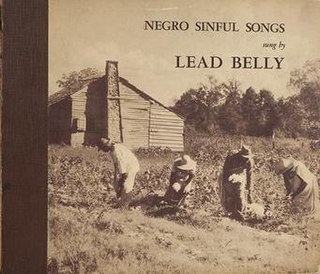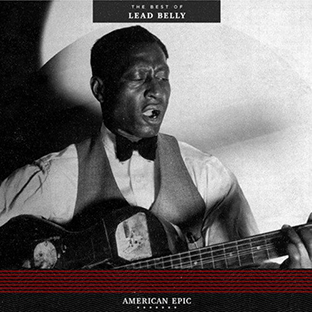Related Research Articles

Huddie William Ledbetter, better known by the stage name Lead Belly, was an American folk and blues singer notable for his strong vocals, virtuosity on the twelve-string guitar, and the folk standards he introduced, including his renditions of "In the Pines", "Goodnight, Irene", "Midnight Special", "Cotton Fields", and "Boll Weevil".
"Goodnight, Irene" or "Irene, Goodnight," is a 20th-century American folk standard, written in 3
4 time, first recorded by American blues musician Huddie 'Lead Belly' Ledbetter in 1933. A version recorded by the Weavers was a #1 hit in 1950.

"Black Betty" is a 20th-century African-American work song often credited to Huddie "Lead Belly" Ledbetter as the author, though the earliest recordings are not by him. Some sources claim it is one of Lead Belly's many adaptations of earlier folk material.
"The Bourgeois Blues" is a blues song by American folk and blues musician Lead Belly. It was written in June 1937 in response to the discrimination and segregation that he faced during a visit to Washington, D.C. to record for Alan Lomax. It rails against racism, the Jim Crow laws, and the conditions of contemporary African Americans in the southern United States. The song was recorded in December 1938 for the Library of Congress and re-recorded in 1939 for commercial release.
"In the Pines", also known as "Where Did You Sleep Last Night?", "My Girl" and "Black Girl", is a traditional American folk song originating from two songs, "In the Pines" and "The Longest Train", both of whose authorship is unknown and date back to at least the 1870s. The songs originated in the Southern Appalachian area of the United States in the contiguous areas of East Tennessee and Kentucky, Western North Carolina and Northern Georgia.
"Grey Goose" is a traditional American folk song. Its subject is a preacher who hunts and captures a grey goose for dinner on a Sunday. He tries to kill the goose prior to eating it, but no matter how hard he tries, he cannot kill it, the implication being that he had not properly observed the Sabbath. The various methods the preacher used to unsuccessfully kill the grey goose were, in order according to the song:
"Rock Island Line" is an American folk song. Ostensibly about the Chicago, Rock Island and Pacific Railroad, it appeared as a folk song as early as 1929. The first recorded performance of "Rock Island Line" was by inmates of the Arkansas Cummins State Farm prison in 1934.
"See See Rider", also known as "C.C. Rider", "See See Rider Blues" or "Easy Rider", is a popular American 12-bar blues song that became a standard in several genres. Gertrude "Ma" Rainey was the first to record it on October 16, 1924, at Paramount Records in New York. The song uses mostly traditional blues lyrics to tell the story of an unfaithful lover, commonly called an "easy rider": "See see rider, see what you have done", making a play on the word "see" and the sound of "easy".
"Take a Whiff on Me" is an American folk song, with references to the use of cocaine. It is also known as "Take a Whiff ", "Cocaine Habit", and "Cocaine Habit Blues".
"Take This Hammer" is a prison, logging, and railroad work song, which has the same Roud number as another song, "Nine Pound Hammer", with which it shares verses. "Swannanoa Tunnel" and "Asheville Junction" are similar. Together, this group of songs are referred to as "hammer songs" or "roll songs". Numerous bluegrass bands and singers like Scott McGill and Mississippi John Hurt also recorded commercial versions of this song, nearly all of them containing verses about the legendary railroad worker, John Henry; and even when they do not, writes folklorist Kip Lornell, "one feels his strong and valorous presence in the song".
Harriet Elizabeth "Hally" Wood was an American musician, singer and folk musicologist. She worked with John and Alan Lomax and participated in the publication of songbooks for the works of artists like Lead Belly and Woody Guthrie. She also performed as a singer and recorded solo and collaborative albums with folk singers such as Pete Seeger.
Folkways Records was a record label founded by Moses Asch that documented folk, world, and children's music. It was acquired by the Smithsonian Institution in 1987 and is now part of Smithsonian Folkways.
Moses Asch was an American recording engineer and record executive. He founded Asch Records, which then changed its name to Folkways Records when the label transitioned from 78 RPM recordings to LP records. Asch ran the Folkways label from 1948 until his death in 1986. Folkways was very influential in bringing folk music into the American cultural mainstream. Some of America's greatest folk songs were originally recorded for Asch, including "This Land Is Your Land" by Woody Guthrie and "Goodnight Irene" by Lead Belly. Asch sold many commercial recordings to Verve Records; after his death, Asch's archive of ethnic recordings was acquired by the Smithsonian Institution, and released as Smithsonian Folkways Records.

The Midnight Special and Other Southern Prison Songs is an album by Lead Belly and the Golden Gate Quartet, recorded for Victor Records in 1940 and released a few months later.

American Epic: The Best of Lead Belly is a compilation of Lead Belly's first commercial recordings made in 1935 and released in 2017 to accompany the award-winning American Epic documentary film series. The album was released as a 14-track download and a vinyl LP.

Leadbelly Sings Folk Songs is a remastered compilation album of American folk songs sung by legend Leadbelly accompanied by Woody Guthrie, Cisco Houston, and Sonny Terry, originally recorded by Moses Asch in the 1940s and re-released in 1989 by Folkways Records.

Play Parties in Song and Dance is an album by Lead Belly recorded in 1941 and released a few months later by Asch Recordings.

Work Songs of the U.S.A. is an album by Lead Belly, recorded in 1942 and released a few months later by Asch Recordings.

Songs by Lead Belly is an album by Lead Belly, recorded in 1943 by Asch Recordings and probably released in 1944.

Negro Folk Songs is an album by Lead Belly, recorded in 1943 and released as an album in early 1946.
References
- 1 2 3 Ross, Alex (October 19, 2021). "Marian Anderson's Bone-Chilling Rendition of 'Crucifixion'". The New Yorker. Retrieved February 20, 2023.
- ↑ Lomax, Alan; Lomax, John Avery (1994). American Ballads and Folk Songs. Courier Dover Publications. pp. 587–88, 625. ISBN 978-0-486-28276-3.
- ↑ Hughes, Langston; Hubbard, Dolan (2001). The Collected Works of Langston Hughes: Works for Children and Young Adults: Biographies . University of Missouri Press. pp. 120, 318. ISBN 978-0-8262-1372-3.
- ↑ "Matrix [Trial 1927-05-04-02]. The crucifixion / Roland Hayes". Encyclopedic Discography of Victor Recordings. Retrieved 12 January 2012.
- ↑ OCLC 17368508
- ↑ Hayes, Roland (1948). My Songs; Aframerican Religious Folk Songs Arranged and Interpreted. Little, Brown and Co.
- ↑ "He never said a mumblin' word / Unidentified [sound recording]:Bibliographic Record Description: Performing Arts Encyclopedia, Library of Congress". Lcweb2.loc.gov. 2011-11-23. Retrieved 2013-08-03.
- ↑ "And he never said a mumblin' word / Unidentified group [sound recording]:Bibliographic Record Description: Performing Arts Encyclopedia, Library of Congress". Lcweb2.loc.gov. 2011-11-23. Retrieved 2013-08-03.
- ↑ "Okeh discography 1941–1945" . Retrieved 11 January 2012.
- ↑ ""He's Got the Whole World in His Hands" – Marian Anderson (1956)" (PDF). Library of Congress. Retrieved February 20, 2023.
- ↑ Wigler, Stephen (April 9, 1993). "The voice of a century Marian Anderson, angel of song, agent of change". The Baltimore Sun. Retrieved February 20, 2023.
- ↑ Keiler, Allan (2002). Marian Anderson: A Singer's Journey. University of Illinois Press. pp. 156–157. ISBN 9780252070679.
- ↑ Ledbetter, Huddie. (1948). "Listen to this, this is a spiritual to tell the story about Christ. Which I guess makes me happy, but you don't know that it comes from down south. Got it from my mother, my shouting mother." Extract of a transcription from Lead Belly's Last Sessions, released on Smithsonian Folkways, SF-400-69.
- ↑ "B. Leadbelly, vcl/gtr, acc. unknown, tp/cl/ts/pno/sb/d on 7,8; with children singing on 5, 8, 9b, 9c, 15 – San Francisco, Ca. 15 February 1945". Complete Recorded Works 1939–1947, In Chronological Order, Vol.5, 27 October 1944 to October 1946 (CD). Lead Belly. Document Records. 1994. p. 4-5. DOCD-5311.
{{cite AV media notes}}: CS1 maint: others in cite AV media (notes) (link) - ↑ "Leadbelly's Last Sessions – Leadbelly | AllMusic". Allmusic . Retrieved May 2, 2011.
- ↑ "Smithsonian Folkways – He Never Said a Mumblin' Word – Leadbelly". Smithsonian Folkways . Retrieved May 2, 2011.
- ↑ "Morton Gould: Spirituals for Strings". AllMusic. Retrieved 30 August 2018.
- ↑ "Morton Gould And His Orchestra - Spirituals For Strings". Discogs. Retrieved 30 August 2018.
- ↑ "Live Nirvana | LiveNirvana.com Sessions History | Studio Sessions | (The Jury) August 20 & 28, 1989 – Reciprocal Recording, Seattle, WA, US". LiveNIRVANA. Retrieved May 2, 2010.
- ↑ True, Everett (2006). Nirvana – The True Story. Omnibus Press. pp. 146, 636. ISBN 978-1-84449-640-2.
- ↑ "Welcome to the Welcome Wagon, by The Welcome Wagon". The Welcome Wagon. Retrieved 2019-05-21.